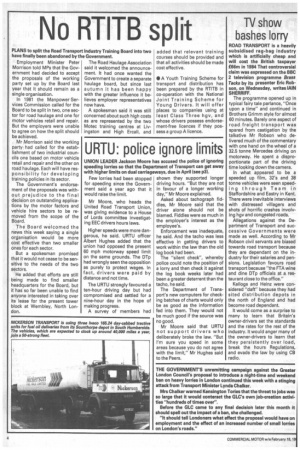URTU: police ignore limits
Page 6

If you've noticed an error in this article please click here to report it so we can fix it.
UNION LEADER Jackson Moore has accused the police of ignoring speeding lorries so that the Department of Transport can get away with higher limits on dual carriageways, due in April (see p3).
Few lorries had been stopped for .speeding since the Government said a year ago that it would raise the limit.
Mr Moore, who heads the United Road Transport Union, was giving evidence to a House of Lords committee investigating EEC drivers hours laws.
Higher speeds were more dangerous, he said. URTU officer Albert Hughes added that the union had opposed the present 60 mph motorway speed limit on the same grounds. The DTp had wrongly seen the opposition as purely to protect wages. In fact, drivers were paid by distance and not time.
The URTU strongly favoured a ten-hour driving day but had compromised and settled for a nine-hour day in the hope of making progress.
A survey of members had shown they supported longer driving hours. "But they are not in favour of a longer working day," Mr Moore explained.
Asked about tachograph fiddles, Mr Moore said that the driver alone should not be blamed. Fiddles were as much in the employer's interest as the employee's.
Enforcement was inadequate, he said. And the tacho was less effective in getting drivers to work within the law than the old log book had been.
The "silent check", whereby police could note the position of a lorry and then check it against the log book weeks later had been a greater deterrent than the tacho, he said.
The Department of Transport's new computers for checking batches of charts would only be as good as the information fed into them. They would not be much good if the source was no good.
Mr Moore said that URTU not support drivers who deliberately broke the law. "But I'm sure you speed in some areas because you do not agree with the limit," Mr Hughes said to the Peers.




















































































